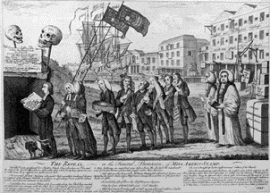What is the Townshend Act?
 April 12, 1770 — Today, the British parliament repealed the Townshend Act on all goods but tea in order to underscore the supremacy of parliament. Pressure from British merchants was partially responsible for the change.
April 12, 1770 — Today, the British parliament repealed the Townshend Act on all goods but tea in order to underscore the supremacy of parliament. Pressure from British merchants was partially responsible for the change.
The issue: On March 5, 1770 debates began in the English parliament on whether or not to overturn the taxes. The government was willing to remove the taxes on everything but tea (because it was not grown in the England and thus they believed the tariff would not hurt British merchants) and the British government wished to maintain the principal that their parliament had the right to tax the colonies.
The negotiation: During the course of the debate the opposition introduced a resolution calling for the duties on tea to be dropped as well. However, that resolution was defeated by the representatives of the government in parliament by a vote of 204 to 142. As a result, the British parliament voted to eliminate the duty on everything but tea.
The impact: The British decision to eliminate the tariff on everything but tea, was too little, too late. By reiterating their claim to be able to tax the colonists — and by not rescinding other aspects of the Townshend Acts such as the independent Customs Authority — the decision served only to inflame the colonialists.
Sources
Words of Wisdom
There is a certain enthusiasm in liberty, that makes human nature rise above itself, in acts of bravery and heroism.





